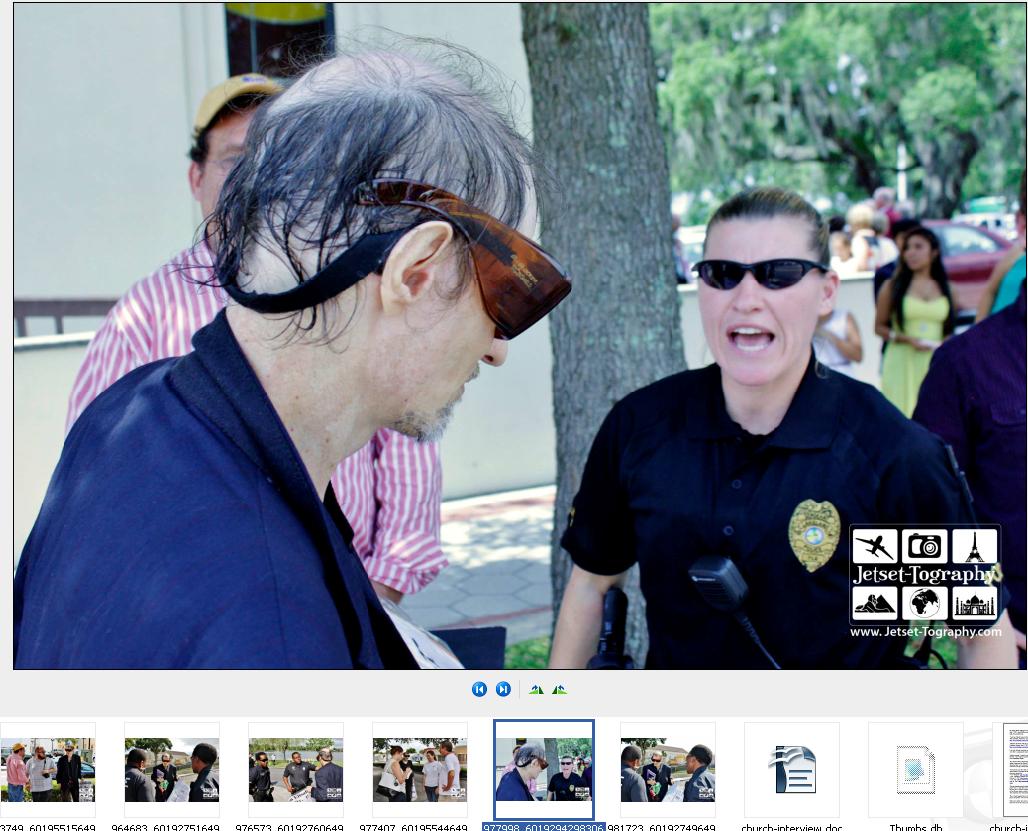
Narrative describing selected prejudicial treatment by the Lakeland (Fla.) Police Dept.:
Police Department violates Federally-protected 1st Amendments Civil rights of Press & Assembly
By Gordon Wayne Watts, Editor-in-Chief, The Register
Published: Sunday, September 21, 2014; Last Updated: Sunday, July 14, 2019
My friend, Brett Upthagrove invited me to the protests scheduled for Saturday, June 1, and Sunday, June 2, 2013, when Westboro Baptist Church of Topeka, Kan., came to Lakeland to protest at several high school graduations:
* cite: “Anti-Gay Church Came to Protest Outside Local High School Graduations,” By Stephanie Allen
The Ledger, Published: Saturday, June 1, 2013 at 11:21 p.m. http://www.theledger.com/article/20130601/NEWS/130609945
* cite: “Westboro Protesters Take On Churches in Lakeland,” By Stephanie Allen, The Ledger, Published: Sunday, June 2, 2013 at 12:01 a.m. http://www.theledger.com/article/20130602/NEWS/306035011
I was sick Saturday morning, but I asked Brett what happened; he said that protestors from both sides were able to communicate and debate, without any violence. Sunday morning, I wanted to interview the protestors for my online Christian-based newspaper, The Resister. I also wanted to protest some. Both of these (Press and Peaceable Assembly) are protected First Amendment Rights.

(Page 1 of 2)
(Page 2 of 2)
The Lakeland Police Department was present at these events, and (see photos) they allowed other news media to interview the visitors, but indicted that they would suppress my First Amendment rights and demanded that I not be allowed to interview them. The leader of the squad that oversaw security at that event was LPD Sgt. Cheryl Kimball, pictured in some of the photos here.
“Free speech zones have been used at a variety of political gatherings. The stated purpose of free speech zones is to protect the safety of those attending the political gathering, or for the safety of the protesters themselves.”
* cite: Wikipedia: http://en.wikipedia.org/wiki/Free_speech_zone
* cite: “Speakers Cornered: Orwellian "Free Speech Zones" violate the constitution, Ronald Bailey | February 5, 2004” http://reason.com/archives/2004/02/05/speakers-cornered
* cite: “Fla. College Student Successfully Fights Campus ‘Free Speech Zone’, By Rebecca McNulty June 28, 2005” http://www.thefire.org/fla-college-student-successfully-fights-campus-free-speech-zone/
The only reasons given for refusing to allow me to interview them was that they didn't know who these people were, or what they were capable of, but, besides violating Peaceable Assembly and Free Press, this was also a violation of Equal Protection (since other press was allowed to interview them), as well as Due Process (since no notice was given of the 'change of rules' since the prior day's rally, regarding what separation was being mandated by the police).
The Police Department might make the argument that I could have interviewed the protestors (like other news media were allowed) had I not been a protestor, myself. That sounds appealing, doesn't it? If I'm a “protestor,” then they can “limit” my free speech, right? However, my FIRST AMENDMENT rights to Free Press don't “disappear” when I decide to exercise my FIRST AMENDMENT rights of Peaceable Assembly (Protest). Why, you might ask?
In other words: “Can a Federal, State, or local government, in the USA, require someone to surrender one Constitutional right as a “condition” of receiving some “other” Constitutionally-protected right?
ANSWER: No—according to the Doctrine of Unconstitutional Conditions. [For example, a television station receiving public funds cannot be forced to refrain from endorsing political candidates. This rule states that the government cannot force a person to choose between two constitutionally protected rights. Unconstitutional-conditions doctrine is also known as doctrine of unconstitutional conditions.] Essentially, this doctrine declares that whatever an express constitutional provision forbids government to do directly it equally forbids government to do indirectly.
See e.g., Nollan v. California Coastal Commission, 483 U.S. 825 and Dolan v. City of Tigard, 512 U.S. 687 (1994)
Other References: http://www.Constitution.org/cmt/right-privilege.htm
And: https://Definitions.UsLegal.com/u/unconstitutional-conditions-doctrine
In other words, The Lakeland Police Department violated my Federal Civil Rights by attempting to condition my Free Press rights on whether or not I exercised my Peaceable Assembly rights – both which are Constitutionally-protected rights. This is ILLEGAL (see the case law) and UNCONSTITUTIONAL (see the case law) and IMMORAL (see your conscience).
This is clearly against the law, for, among other reasons, as the government may regulate the time, place, and manner—but not content—of expression in a Free Speech Zone.
Moreover, the Police Department didn't muzzle the peaceable assembly rights of the protestors the first day (that I was sick), and so their illegal actions the next day are deplorable, and inconsistent.
Other news media, those with a less obvious slant towards their religious beliefs, were able to get an interview, but not me: This is prejudiced—illegal—immoral--and unconstitutional—as well as impractical, insofar as it unnecessarily gives the department a bad name.
Gordon Wayne Watts, Editor-in-Chief, The Register
www.GordonWatts.com / www.GordonWayneWatts.com
(Page 2 of 2)